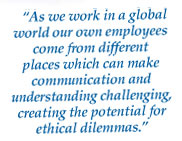By: Dr. Richard King and Cynthia Bennett

When we talk about Ethics and Values in the business world, there is an assumption that all parties know what we are referring to. However we all know that ethics and values in the broader sense are not consistent, even within our own business sphere. As we work in a global world, our own employees come from different places, which can make communication and understanding challenging, creating the potential for ethical dilemmas.
Over many years in business, we have dealt with these issues with a variety of strategies. During one contract negotiation, just as we agreed upon signing the contract, and were moving to the next phase of the project, our counterpart mentioned his car. He said that it was hard to find parts for his vehicle and he would be more inclined to sign the contract with us if we would be so kind as to procure some parts for him, stateside. He pulled out a list of over 25 items! We finally agreed to bring over 5 car parts personally and the deal was signed. On another occasion, we were negotiating a very large contract for a big development. At the last minute, the company’s negotiator told us that we would have to use their handpicked people to work on the job. This meant that our expenses would be much greater and we would have less control over the project as a whole. In this case we declined to continue with this project.
 Another example is dealing with personal favors that are common in doing business in the Pacific Rim. We found that the practice of helping someone who has helped you is in fact an imperative. Consider the business implications; you are establishing a new business in a new country, another local business is in the same line of work, with similar products. You are both competing for an RFP (Request for Proposal) issued by a large local company. What you do not know is that previously the president of the company’s daughter was trying to get into a university that your competitor had some pull (his sister was a trustee). His daughter got into the university, and who do you think will get the contract? This type of thing happens here as well of course, but is openly expected in many countries. Another example is dealing with personal favors that are common in doing business in the Pacific Rim. We found that the practice of helping someone who has helped you is in fact an imperative. Consider the business implications; you are establishing a new business in a new country, another local business is in the same line of work, with similar products. You are both competing for an RFP (Request for Proposal) issued by a large local company. What you do not know is that previously the president of the company’s daughter was trying to get into a university that your competitor had some pull (his sister was a trustee). His daughter got into the university, and who do you think will get the contract? This type of thing happens here as well of course, but is openly expected in many countries.
In order for our local companies to work effectively with foreign countries it is important to know all of the rules, both governmental and cultural. The US government has a law that is supposed to counteract the common practices that may be found in other parts of the world. Look it up, “The Foreign Corrupt Practices Act” http://www.justice.gov/criminal/fraud/fcpa/. It is important to be well informed of the laws on both sides of the ocean. Many companies have found ways to work within the common practices found abroad by creating companies based in the country of operation. It would be best to talk to seasoned business people who are familiar with working with the country you are thinking of working.
Most important in our view is to make sure your company and your representatives take the time to create lasting relationships with the business owners you want to work with. Imagine working with them for over ten to twenty years. Then proceed with an open heart, respect for others and good business sense.

|